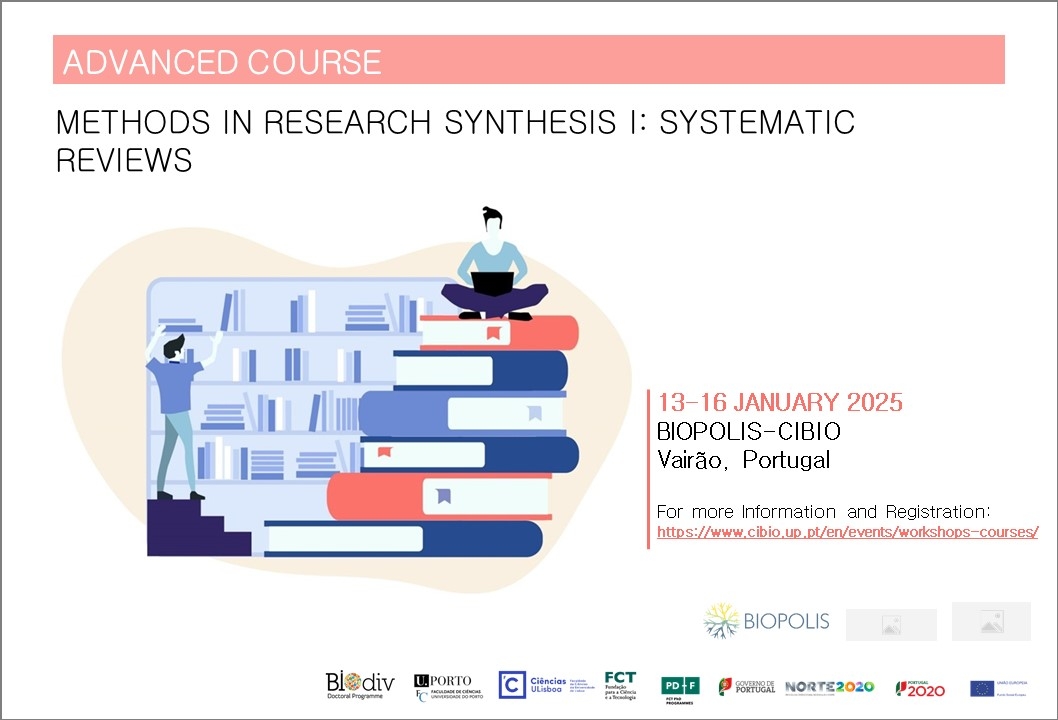Methods in research synthesis I - Systematic Reviews
From 13 Jan 2025 until 16 Jan 2025 - BIOPOLIS-CIBIO, Vairão, Portugal (Face-to-face)

Research synthesis, the process of synthesising research findings, has increased in all research fields. The course is developed for students and researchers at an early stage of their career and aims to provide the basics of literature search and review. Participants will be able to:
(1) understand the process of research synthesis, incl. search protocols and software;
(2) conduct a systematic literature search and review; and
(3) apply different methods for analyzing published scientific evidence.
PROGRAM
DAY 1 – January 13
Morning
09h45 – 10h00
Opening session
10h00 – 11h00
Introduction to research synthesis
o What is Research Synthesis?
o Historical Overview and Evolution
o Types of Research Synthesis
o Standards and Guidelines for Systematic Research
o Steps to Write a Systematic Review
11h00 – 11h30 Break
11h30 – 13h00
Protocols of literature searches
Software for literature management: Mendeley and EndNote
13h00 – 14h00 Lunch
Afternoon
14h00 – 15h30
Performing a literature search with search engines (Practical 1)
o Literature search – Introduction
o Exploring the databases
o Definition of keywords – PICO
o Definition of search string
o Conducting the search
o Evaluation of different search strings
o Additional searches
o Concluding the search process
15h30 – 16h00 Break
16h00 – 17h00
Gathering and reviewing published evidence (Practical 2)
o Literature review – Introduction
o Gather published records
o Designing and applying exclusion/inclusion criteria
o Create a database
o Define data categories
17h00 – 17h45
Challenge release! (own or new ideas for conducting a literature review)
DAY 2 – January 14
Morning
Afternoon
14h00 – 15h00
Analysing and presenting the outcomes of literature reviews (Practical 3)
o Previous day overview
o Useful tools for data analysis and presentation
o Vos Viewer
o Online resources
15h00 – 15h30 Break
15h00 – 17h45
Working group session 1 – Challenge development
DAY 3 – January 15
Morning
09h45 – 13h00
Working group session 2 - Challenge development
13h00 – 14h00 Lunch
Afternoon
Working group session 3 – Challenge development
DAY 4 – January 16
Morning
Working group session 4 – Challenge development
13h00 – 14h00 Lunch
13h00 – 14h00 Lunch
Afternoon
Working group session 5 – Challenge presentation
Closing session & course evaluation
CALENDAR
4 days - 28 hours - Schedule: 09:45 - 13:00 & 14:00 - 17:45
COURSE INSTRUCTORS
Coordination
Cláudia Fernandes | FCUP/ BIOPOLIS-CIBIO
Joana Vicente | BIOPOLIS-CIBIO
Instructors
Ângela Lomba | BIOPOLIS-CIBIO/ FCUP
Ana Margarida Medeiros | BIOPOLIS-CIBIO/ FCUP
Catarina Patoilo Teixeira | BIOPOLIS-CIBIO/ FCUP
Ana Margarida Medeiros | BIOPOLIS-CIBIO/ FCUP
Catarina Patoilo Teixeira | BIOPOLIS-CIBIO/ FCUP
Christian Kohl | Julius Kühn-Institut
SELECTION CRITERIA
The course will be open to a maximum number of 20 participants.
75% of available student slots are reserved for BIODIV students.
Priority will be given to:
• 1st year and other PhD students attending the BIODIV Doctoral Program;
• PhD students attending other courses;
• Other post-graduate students and researchers.
(A minimum number of participants is required for the course to take place)
APPLICATION
Deadline: 14 November 2024
To apply fill the FORM
A copy of the form will be sent to the email address you provide as proof that you have successfully submitted your application. Results will be emailed to you within 8 working days of the application deadline.
REGISTRATION
80€ (students) | 120€ (other participants).
BIOPOLIS/ CIBIO members will have an additional discount of 20%. Participation is free of charge for BIODIV Students MBGE 1st year Students & CIBIO's TwinLabs
(If applicable, payment will be made to Associação BIOPOLIS - VAT No. 516033727. Information on the payment amount and the payment deadline will be sent together with the results notification, and a proforma invoice may be issued in due time).
MORE INFORMATION
Registration fees do not include accommodation or meals.
No ECTS credits are awarded for attending the course. Participants receive a certificate of attendance without quantitative evaluation.